
Sydney Rows
A Centennial History of the Sydney Rowing Club, 1970, by A L May
Table of Contents
Chapters
- Preliminaries: before 1870
- Foundations: 1870-1880
- New Clubs: 1880-1890
- The Amateur Question: 1890-1900
- Sydney on Top: 1900-1910
- Henley and War: 1910-1920
- Pearce and Mosman: 1920-1930
- Financial Problems: 1930-1940
- War and Wood: 1940-1950
- Strength and Stability: 1950-1960
- On Top Again: 1960-1970
Appendices
11. On Top Again: 1960-1970
Chapter Eleven page 1 2 3 4 5 6
The decade was a very active one on the social scene. A major development was the regular engagement of a dance band each Saturday and Sunday night during 1960/61, this being aimed at encouraging young members and their friends to attend the club house more frequently. The move proved successful and was maintained throughout the decade, although with various changes being tried in the type of entertainment from time to time.
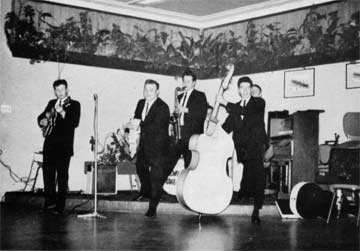
Weekend Entertainment
The annual ball was reintroduced in 1962 after a break of six years. The ballroom of the Five Dock RSL was the location of the successful function and it was held there again in 1963. From 1964, the club moved back to the Wentworth Hotel for the event but, after the demolition of the Wentworth, a further move was necessary. The 1967 ball was held at the Pickwick Club and the location in both 1968 and 1969 was the Sky Lounge.
The 1970 Centenary Ball was held at the Menzies Hotel and was a great success. The annual dinner was a major feature of the club's activities each year, a well-known speaker being invited on each occasion. The guests of honour were Ian Craig (1960), John Devitt (1961), Tony Madigan (1962), Mr. Justice Herron (1963), John Thornett (1964), Bill Young (1965), Sir Roden Cutler (1966), Allan Audsley (1967), Sir Eric Harrison (1968), Bill Northam (1969) and Sir Edgar Tanner (1970).
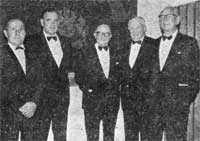
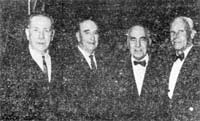
Left - Centenary Dinner - Harry Clare, George Parlby, Sir Edgar Tanner, Sir Harold Alderson, Fred Meares. Right - Four 1919 veterans at the 1968 dinner: Tom McGill, Jack Cogle, Sir Eric Harrison, Allan Audsley.
A formal Dinner Dance was held in November, 1960, on the club's premises and it proved so successful that it became an annual event, while the New Year's eve revel and the children's Christmas party continued to be great successes. A range of other picnics, barbecues, fashion parades, theatre nights, gas-light nights, euchre nights, fundraising dances for other clubs, prawn nights, bucks' nights, active oarsmen's nights and so on were held from time to time during the decade. Functions arranged by the Union of Old Oarsmen were also held at the club each year.
Towards the end of the decade, much attention and effort was devoted to the planning of a memorable series of events for 1970, the centenary year. Social secretaries Alf Duval snr, and Harry Clare undertook much of the organisation of the activities in the first half of the decade, with great support from the Ladies' Auxiliary of the club.
After the appointment of the Secretary/Manager, however, the main burden of organisation passed to his shoulders. The need for a formal Ladies' Auxiliary was also deemed to have passed, but substantial assistance from the ladies continued, especially for the children's party and the Sydney Old Boys' Sunday luncheons. Especially worth of note - and over a long period of time - were the efforts in this direction of Maud Goulding, Gwen Rosevear, Mel Clare, May Agnew and Plassy Chadwick.
Indoor bowls was an established part of the club's life. Bowlers were entered in NSW Indoor Bowling Association matches and in other competitions, while club championships and social matches were arranged. Ted Connors and Geoff Carroll proved outstanding in the club's own competitions, while Ken Burke, Herb Turner and Ned Ford also added their names to the list of singles champions. Pairs and fours championships were also conducted, with Col Scott, Les Brown and Bob Norton working hard on the organisational side. Competitions with other rowing clubs were also arranged.
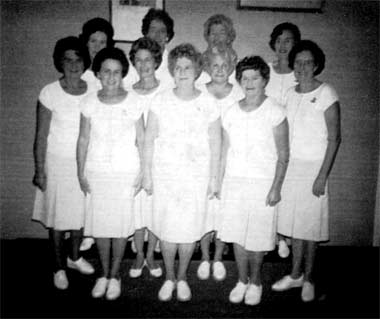
Members of the ladies' bowling club
Keen interest was soon being shown in the bowling by the ladies and, in 1963/64, the SRC Ladies' Indoor Bowling Club was formed. They too entered teams in the pennants and held their own competitions, while mixed bowling nights were soon a regular feature at the club. Plassy Chadwick and Lil Callaghan were regularly amongst the most successful of the lady bowlers.
Attendances of around 60-70 old members were recorded at most Sydney Old Boys' Union functions, held usually three times each year. Social rowing outings, boat christenings and, of course, conviviality and reminiscing continued to make up the agenda. The group was also the major force behind the organisation of the annual Dinner Dance at the club. Chairmen of the Union during the decade were Jack Darby, Ossie Rosevear, Gordon Clubb and Ernie Chapman, while Harry Clare and Eric Perry bore the major burden as secretary. Treasurer throughout the period was Ernie Ireland.
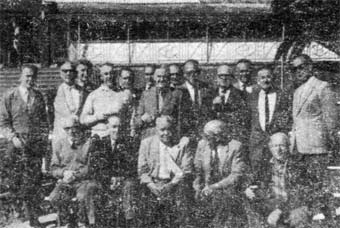
An old boys day in 1968
A keen participant in the winter point score and other club activities in the early years of the decade was John Burke, one of a number of blind oarsmen to make use of the club's facilities.
Races for club members only continued. The winter point score maintained its well-established pattern of four events held, usually, over successive Sunday mornings. Oarsmen for the various grades were selected into crews through the drawing of names from a hat, with some interesting combinations resulting.
The first event of the decade, in 1960, was especially exciting, with four members gaining equal points for each of the "A" and "B" grades, with row-offs being necessary. Winners of the "A" grade for the Q.L. Deloitte trophy were Jim Goulding (1960, 1961 and 1965), Alf Duval (1961 and 1962), Geoff Knight (1962), Ken Burke (1963), Graham Angus (1964), Graeme Armstrong (1966), Bob Allen (1967 and 1968), and Bob Powell (1969).
In September, 1962, a club gladstone skiff championship was conducted. There were 40 entries and four divisions were held with heats and finals being necessary. As the annual report commented, "varied and unique styles were noted". Winners of the divisions were Alan Dougherty (scullers handicap division), Bob Wallwork (junior-senior division), Ken Burke (lightweight junior-senior division), and Carl Parker (novice-maiden division). It was hoped the championships would become an annual event, but none other was held.
There were important developments in the coaching sphere, with many members assisting in this work. Phil Cayzer returned to coaching at the club in the 1960/61 season and he was the senior coach for most of the decade. Norm Grounds coached the seniors in 1964/65 and 1965/66, while Alan Callaway took over late in 1967/68, the Olympic preparation year, when Phil was overseas. Neil McCallum coached the lightweight seniors until the 1962/63 season when Norm Grounds took over proved a very worthy successor.
The club's junior oarsmen were schooled at various times by Bill Andrews, Norm Grounds, Frank Nichols, Stewart Derwin, Phil Cayzer, Don Sutherland, Mark Farmer, Howard Holden, Alan Callaway, Bob Stone and Ray Green. The list of those assisting the many novices and maidens is an even lengthier one. It includes George Carlson, Noel Green, John Magner, Bill McMahon, Doug Donoghue, Bill Purcell, Des Dalton, Graham Pilger, Bill Monks, Alan May, Con Colivas, Geoff Knight, Ken Burke, Stuart Agnew, Howard Holden, Keith Jameson, Ray Green, Max Napier, Bill Heyde, Bill Fanning, Ron Latham, Ron Meehan and John Brown.
A major departure in the coaching field almost took place in 1965/66. The annual report put it as follows:
"After long consideration, the Club Committee decided this year to seek applicants for the position of professional coach of the club. It was considered that the club's size and the wide-ranging duties falling on voluntary coaches warranted serious examination of the economics and desirability of employing a suitable person on a full-time basis to co-ordinate and plan the club's efforts on the river. Alternatively, it was thought that a part-time appointee to conduct a nursery for novice oarsmen and to undertake recruitment projects would be a major step forward and one within the capacity of the club to undertake."
"Accordingly, advertisements were placed in major newspapers and wide publicity was received. A reasonable number of applications for the positions were received, but the Committee decided against making either appointment."
In the first part of the decade, the normal method of selection was to appoint two overall selectors who were joined by the particular coach involved to select each crew. In 1963/64, however, separate selectors for the senior and junior division were elected and, in 1965/66, the one group of selectors for senior and junior crews and another group for maiden and novice. In the latter years of the decade, it became customary for the coaches, especially of the senior crews, to act also as selectors.
Physical training classes during the winter months were conducted under an instructor from 1962/63, the experts involved being Bernie Hall, Sam Herford, Arthur Williams and Vince Agnew.
A range of annual awards to members continued to be made. Four were deemed deserving of the Honour Blazer, the club's highest award. They were Charlie Stewart (1960/61), Fred Meares (1962/63), Ossie Rosevear (1963/64) and Harry Clare (1965/66). Three others were made honorary life members of the club: Norm Grounds (1966/ 67), Merv Wood (1967/68) and Alf Duval jnr (1968/69).
The W. J. Goulding Memorial Trophy for the most improved oarsman was awarded as follows: Rod Whereat (1960/61), Bruce Holden (1961/62), Geoff Dunlop (1962/63), Denis Purcell (1963/64), Dennis Carmody (1964/65), Joe Fazio (1965/66), Bob Tagg (1966/67), John Nickson (1967/68) and Ron Hyslop (1968/69).
Winners of the John Hackett Memorial Trophy for scoring most points for the club in Association regattas were Stuart Agnew and Don Brewer (1960/61), Frank Davies (1961/62), Jim Goulding (1962/63), Bob Powell (1963/64), Ian Carmody (1963/64 and 1964/65), Bob Allen (1965/66 and 1968/69), Ron Latham (1966/67) and Graeme Farrell (1967/68). The winners of the awards for the most meritorious coach and coxswain, for the most promising novice oarsman of the winter months, and of a new trophy, presented in 1960/61 by Allan Cook, for the most improved coxswain are shown in the table.
Two more awards were instituted during the decade. In 1963/64, a special award of merit for coaching in novice ranks was given to Ray Green, and this was continued thereafter with the recipients being Con Colivas (1964/65), Keith Jameson (1965/66), George Carlson and Ernie Ireland (1966/67), Geoff Knight (1967/68) and Noel Green (1968/69). In 1962/63, Judge Frank Hidden gave two awards for the gladstone skiff races and, when this competition was discontinued, he decided to present two trophies to be awarded at the discretion of the committee for special merit. They were given to Bruce Byron and Ron Meehan (1963/64), Carl Cameron and Ray Green (1964/65), Denis Purcell and Ian Carmody (1965/66), John Meredith and Keith Jameson (1966/67), Larry and Andy Favaloro (1967/68), and Alan May (1968/69).
| Year | Most Meritorious Coach |
Most Meritorious Coxswain |
Most Promising Novice |
Most Improved Coxswain |
|---|---|---|---|---|
| 1960/61 | Neil McCallum | Graham Thurkettle | Ray Green | Larry Parker |
| 1961/62 | Phil Cayzer | Larry Parker | Bill Glover | Bob Gardiner |
| 1962/63 | Norm Grounds | Larry Parker | John Lawler | Larry Crick |
| 1963/64 | Doug Donoghue | Alan Grover | Jim Hanson | Terry Phillips |
| 1964/65 | Stewart Derwin | Larry Crick | Dick Robertson | Alan Phillips |
| 1965/66 | Howard Holden | Larry Crick | Jim Kornmehl | Rick Armstrong |
| 1966/67 | Bob Stone | Alan Phillips | Bob McMillan | Robert Arentz |
| 1967/68 | Phil Cayzer | Kevin Hollingworth | Ross Ruhan | Doug Kirby |
| 1968/69 | Bob Stone | Alan Grover | Jim Hart | Barry White |
